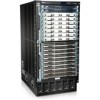Dell PowerConnect J-8216 Release Notes JUNOS version 10.3 - Page 38
Upgrade, USB Modem, Virtual LANs (VLANs), On J-SRX100 High Memory
 |
View all Dell PowerConnect J-8216 manuals
Add to My Manuals
Save this manual to your list of manuals |
Page 38 highlights
Junos 10.3 OS Release Notes • On J-SRX210 and J-SRX240 devices, the Websense server stops taking new connections after HTTP stress. All new sessions get blocked. As a workaround, reboot the Websense server. [PR/435425] • On J-SRX240 devices, if the device is under UTM stress traffic for several hours, users might get the following error while using a UTM command: the utmd subsystem is not responding to management requests. As a workaround, restart the utmd process. [PR/436029] • On J-SRX100 High Memory, J-SRX210 High Memory, and J-SRX240 High Memory devices, the antispam requests more than 1500 are not supported due to system limitation. [PR/451329] Upgrade • Low-impact ISSU chassis cluster upgrades are not supported in Junos OS Release 10.3. ISSU upgrade to 10.3 might cause loss of configuration. In order to upgrade to 10.3, use the normal upgrade procedure described in the Junos OS Installation and Upgrade Guide . [PR/526599 and PR/526829] USB Modem • On J-SRX210 High Memory devices, packet loss is seen during rapid ping operations between the dialer interfaces when packet size is more than 512 Kbps. [PR/484507] • On J-SRX210 High Memory devices, the modem interface can handle bidirectional traffic of up to 19 Kbps. During oversubscription of 20 Kbps or more traffic, the keepalive packets are not exchanged and the interface goes down. [PR/487258] • On J-SRX210 High Memory devices, IPv6 is not supported on dialer interfaces with a USB modem. [PR/489960] • On J-SRX210 High Memory devices, http traffic is very slow through the umd0 interface. [PR/489961] • On J-SRX210 High Memory devices, on multiple resets of the umd0 interface, the umd0 interface keeps flapping if the d10 (dialer) interface on either the dialin or dialout interface goes down because no keepalive packets are exchanged. As a workaround, increase the ATS0 value to 4 or greater. [PR/492970] • On J-SRX210 High Memory devices, the D10 link flaps during long-duration traffic of 15-Kbps and also when packet size is 256 Kbps or more. [PR/493943] Virtual LANs (VLANs) • On J-SRX240 devices, tagged frames on an access port with the same VLAN tag are not dropped. [PR/414856] • On J-SRX100, J-SRX210, and J-SRX240 devices, the packets are not being sent out of the physical interface when the VLAN ID associated with the VLAN interface is changed. As a workaround, you need to clear the ARP. [PR/438151] • On J-SRX100 Low Memory, J-SRX100 High Memory, J-SRX210 Low Memory, J-SRX210 High Memory, and J-SRX240 High Memory devices, the Link Layer Discovery Protocol 38















